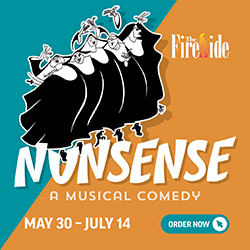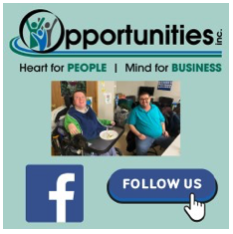‘The Ukrainians are the superstars,’ former exchange student, addressing Whitewater Rotary, says
- Home
- ‘The Ukrainians are the superstars,’ former exchange student, addressing Whitewater Rotary, says
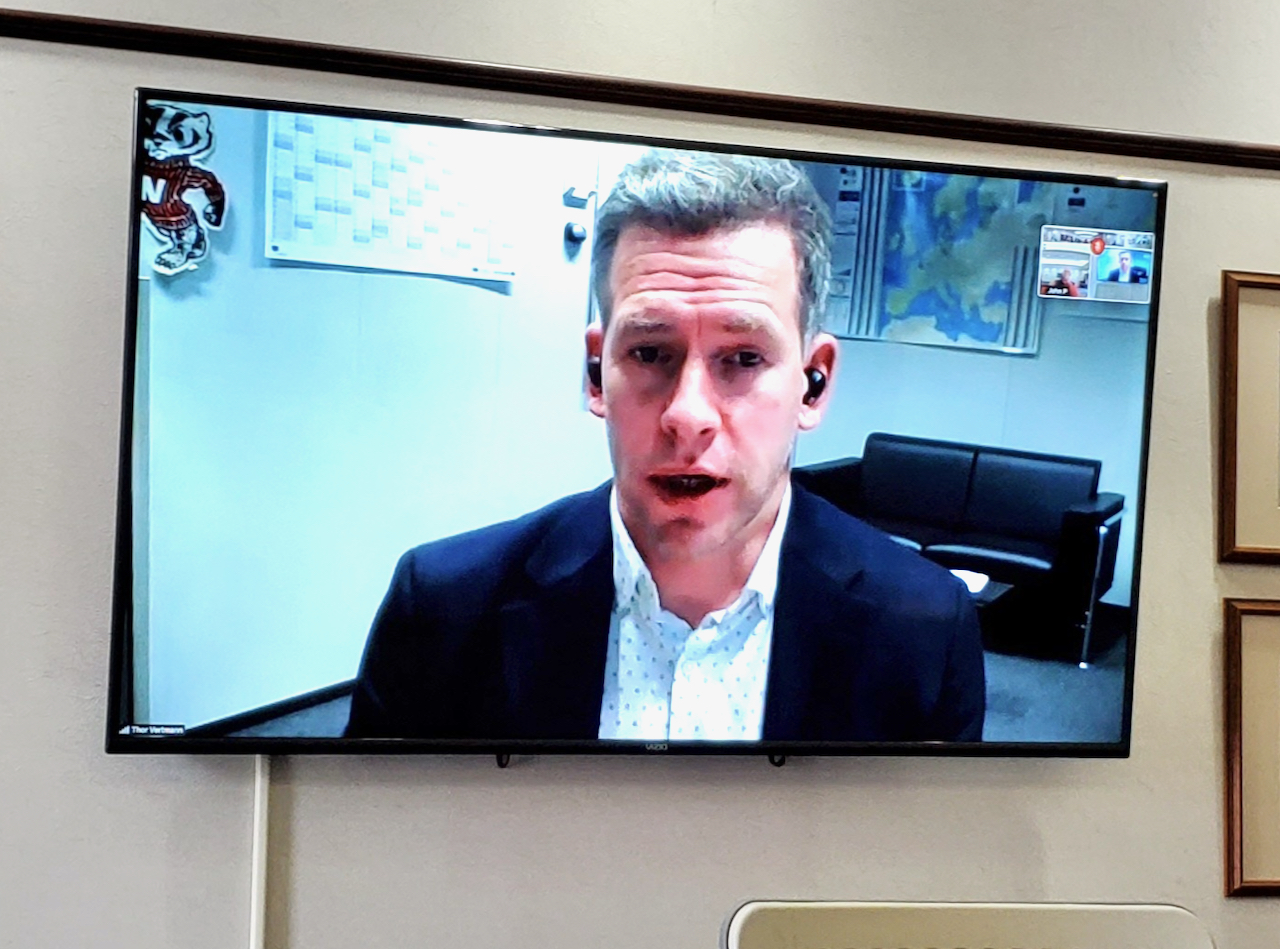
‘The Ukrainians are the superstars,’ former exchange student, addressing Whitewater Rotary, says
By Chris Spangler
The people of Ukraine are “superstars” for standing up to a big bully, a former Estonian exchange student told Whitewater residents during a recent Zoom meeting.
Thor-Sten Vertmann, a Rotary Youth Exchange student who attended Whitewater High School in 1995-96, is a member of the European Commission’s College of European Commissioners. Last month, he spoke to the Whitewater Rotary Club, area foreign-exchange students and members of Whitewater High School’s Model United Nations Club.
While in the United States, Vertmann lived with host family Ron and the late Kathy Binning and their son, Randy, in Whitewater. A daughter, Kari, was away in college.
He graduated from Whitewater High School in 1996 and went on to study political science and English language and literature in his hometown at the University of Tartu, Estonia. He also studied one semester at the University of Melbourne in Australia.
Vertmann became a civil servant in Tartu city government, working his way up to posts in several Estonian governmental bodies.
“What was happening in Estonia at the time was the secession process to the European Union, on which we finally capitalized in 2004, already 20 years ago,” Vertmann said. “That led me to first work for the governmental agencies in Estonia, coordinating the alignment of policies with those of the European Union, and now since 10 years ago, I’ve been working with European institutions here in Brussels.”
Specifically, since 2015, Vertmann has worked in Brussels, Belgium, serving two European commissioners — political appointments in European Union’s executive branch, the European Commission — from Estonia.
He currently is on the team of Energy Commissioner Kadri Simson, covering the electricity market, nuclear energy and energy efficiency. Her position is the equivalent of the secretary of energy in the United States.
His Whitewater start
Vertmann said his year abroad a quarter-century ago sparked his eventual career.
“My arrival in Whitewater, Wis., was the beginning of a journey,” he said. “I am Estonian, from a small town, living now in The Hague, The Netherlands, working in Brussels, Belgium, so I’ve moved around quite a lot. But in the beginning of the journey, it’s fair to say, was in Whitewater, Wis.”
That was in the mid-1990s, shortly after Estonia regained its independence from the Soviet Union in 1991.
“Literally, I had traveled around in the Soviet Union, but to the western world, never. So that was my first trip to anywhere in the free world,” he recalled.
“I had never seen a skyscraper before landing in New York and walking the streets of New York and ending up with a stiff neck at the end of the day. It was really a cultural blast, very different from what I was used to. Of course, my experience was very unique, as would be any experience of an exchange here today. It’s nothing comparable,” Vertmann said.
He pointed out that in the mid-1990s, there was no social media and it was almost impossible to communicate home to family and friends. In fact, he had to send a fax to his parents to let him know when he would be coming home after his year abroad.
“Basically, you are in a completely different environment, so you are just like a sponge and take everything in,” he said. “That’s how it went down.”
Vertmann said it actually was good to fully integrate into American life, both culturally and language-wise.
“I think it took me about three months to start thinking and dreaming in English. I never mastered English as an English speaker, but I am happy that I had this full, really thrown-into-the-water-and-can’t-swim immersive experience,” he noted.
Vertmann said that upon arrival, he immediately was struck by the openness of Whitewater, the high school and Binning family. And he was even more impressed by Americans’ sympathy toward international crises.
“In the states, it would have been easy to be self-centered and not interested in what was going on in the world, but that was not the case. My vivid memory is a discussion in junior English class and the students and teacher (agreeing) … that you can’t ignore a situation because there’s a war going on and somebody is getting aggressed for no reason,” he said.
Vertmann added, “You shouldn’t detach yourself from anything. This globe still is a small place and it’s all connected.”
A world view
Estonia’s advance toward independence was an exciting time that led to Vertmann’s job with the European Commission proper and on the energy front.
“And if 2017 seemed like an exciting time, then the current five-year mandate of the commission is even more difficult to put into words,” Vertmann said. “That’s because COVID first, then the energy crisis and then the Russian war of aggression against Ukraine made it a very challenging job, especially in our policy area.”
He offered some personal thoughts about Russia’s invasion of Ukraine.
“I don’t think there is a right or wrong answer in trying to explain or decode what is happening (in Ukraine), but I think, for me, the easiest explanation is … there is a bully in this context,” he said.
“In situations such as these, you at first try to make friends a little bit with the bully or ignore the bully or just cope with the situation,” Vertmann observed. “But you know, when you don’t really address the problem, it just encourages the bully. And the situation grows worse and worse and that is what we’ve seen with the actions on the Russian side over the years.
“Eventually, somebody stood up and fought back,” he continued. “The Ukrainians are the superstars.”
But the fight is ongoing, and what individuals can do is contribute toward supporting the families affected.
“We talk about global politics and political systems in the world. There is nothing in the rulebook that you can enforce on the bully,” Vertmann said. “The only question is how long the brave people in Ukraine are fighting back. I don’t have any crystal ball on that.”
He said that an end to the war in Ukraine will be the starting point of some type of transition in Russian society.
“Whether there is a sustainable way for Russian society to fit this into the future world, I don’t know. Will we ever be able to travel to Russia? That’s a good question. But yes, let’s hope that the new changes in the region will start soon,” he said.
Vertmann said, however, that on a positive note, the European policies have succeeded while living through COVID-19, the energy crisis and the war.
“We do have political stability in the member states and the European Union, which is valuable. We have partnerships with the U.S., U.K, that will matter to somehow solve these issues in the global terms,” he said.
“I know it’s a bit gloomy picture, but this is the mood on our side. I hope you have questions and I can cheer it up.”
Student questions
Students in Model United Nations asked Vertmann a variety of questions:
Q: How does the Congressional budget package being debated (in the U.S.) directly impact what you do (aid-wise) and what kind of information do you get in Estonia in regard to what goes on in the United States?
Vertmann: “That is a very good question because our important partnership means that we somehow need to align the things that we do with the European Union on one side and the United States on the other end. We’ve had discussions of what will happen with delays on decision-making on the U.S. side., but there is no reason to point fingers. I think the key message is that the trusted partners in the world are very valuable at this time, but indeed, what we’ve had to do and what we’re happy to do, especially toward Ukraine, … is to adjust our actions depending on decisions.”
He said that Estonia’s gross domestic product (GDP) per-capita assistance to Ukraine is the largest in the world.
“Yet I think we can all do better,” Vertmann said. “It would be a very sensible thing to put money somewhere else and not spend our resources … This includes the lives of people in war wherever it is in the world. But (to repeat) my parallel with the bully in school, if someone is fighting back at them, then I don’t want to ask questions and I must give my best efforts there to assist.
“So yes, the discussions with the U.S. and now the proposal is with the Senate, I believe, we follow it very closely.”
Q: What motivated you to go into public service?
Vertmann said that after regaining its independence following the breakup of the Soviet Union, Estonia start rebuilding.
“So first, there was a need for younger people who weren’t really poisoned by the way the Russian society worked. The easiest example: corruption. But also, there was a lack of trust, just being suspicious about everybody and everything,” Vertmann said. “Transition is never easy, so there was a need for people with modern educational backgrounds to step in.
“And I think there was a feeling among young people at the time that there was a moment in history where you want to step in and make a difference.”
That was his motivation to enter public service, Vertmann said.
“I’ve never felt that I’m running out of important things to look at in my career. With every challenge, it’s also been very exciting pathway to keep my personal motivation up as well.”
Q: What is your take on Finland joining NATO?
Vertmann: “Finlandization is a term used for a specific phenomenon in social or political science, and it’s impossible to judge or, again, point fingers against anyone who had to organize their life next to the Soviet Union. Finlandization was a coping mechanism, trying to negotiate and remain neutral where possible.”
A positive borne by the war against Ukraine is the international realization that “there are many, many things in global politics that we thought would work, but haven’t, and we need to reconsider our self-defense and preparedness side,” he noted.
“I myself have grown pacifist throughout the years, but there is no question at the moment that we, the states against the Russian border, really need to be ready for anything that you can imagine.”
Thus, Finland and Sweden’s decisions to join NATO.
“(Russia President Vladimir) Putin wanted to make NATO weaker, but the outcome is the opposite,” Vertmann said.
Q: Model U.N. plays the role of a country or diplomat. What makes a good diplomat and what advice on skills would you give when students are representing a country in a simulated session?
Vertmann pointed out that he never has been a diplomat, and one cannot compare exactly the United States and European Union. However, he did cite a kind of federalization process in the E.U.
“Do Estonia and Latvia have a diplomatic relationship or is it civil servants from different areas talking to one another? It’s the latter,” he explained.
Each nation tends to have its own interests and negotiating style, Vertmann said.
“But maybe we kind of succeed, because my only advice to give is that it’s very difficult to strategize, try to form alliances and play some alliances against other alliances, and it grows more and more complex over time because you really almost are forgetting what you told the last person that you saw and are supposed to tell different things to different people. At the end of the day, it’s overwhelming,” he noted.
However, Vertmann added, if you truly are an “honest broker treating everybody on an equal footing, everybody knows what to expect from you. Everybody understands that you don’t play different games with different counterparts. You don’t try to trick them. And this environment of trust does pay off. To strategize and trick your way through negotiations is a swamp and you will be bit by bit going into it and then it is very difficult to get out.”
His second piece of advice in diplomatic skills was to just remain yourself.
“Don’t try to be anyone else. If you’re good at telling jokes, tell a joke as an icebreaker. If you’re not a funny guy or girl, don’t do it. Anyone can give you any advice; just look inside you,” he advised. “What is your experience? What strengths have you developed over your studies and life? And do your efforts based on that.”
Q: Can you tell us about your family?
Vertmann said that he, his wife and their son, 10, and daughter, 8, reside in The Hague in The Netherlands. His wife works in The Hague for Europol, Europe’s equivalent to the international criminal police organization Interpol.
Vertmann, who speaks Estonian, English, French and Russian, commutes 110 miles to Brussels, Belgium, during the week. It takes about 2.5 hours each way.
Q: What’s been most difficult challenge in your role?
Vertmann said the work-life balance is a challenge because “Brussels is the burnout capital … and it’s very demanding for those people who work here. You need to continuously recharge the things you take in during the day and that’s, by far, the most difficult part of the job.”
He said that he joined a volleyball club and learned to speak French with friends who have no link to the European Union, and this has helped his mental health.
“These people don’t know what I am doing at work and don’t know much about the European Union and that’s my best pastime,” he said.
Q: Where is Europe getting its LNG (liquid natural gas) and oil and are you rationing at this point in time?
Vertmann said that after Estonia gained independence, there was no gas available other than that from Russia. Thus, LNG was an important fuel.
“LNG is a global market and it is very difficult to manipulate,” he said. “We’ve had a lot of discussions around nuclear technologies recently, so I am more excited about those things. Geopolitics and the weaponization of the energy supply is very much based on the dependence on the import of fossil fuels.
“The fact is the import dependence on fossil fuels has been quite dreadful over the past years,” Vertmann added. “I think the crisis has been a success story as people, communities, states and politicians come together in the spirit of solidarity to figure out the solutions.”
He cautioned that the solutions are not without consideration of rationing or limiting consumption.
“However, we’ve avoided that and we’ve worked hard to find new capacities worldwide,” Vertmann noted.
He said LNG imports represent a crucial partnership with the U.S., as well as other countries.
“Maybe we’ve been lucky, though I don’t think so. We’ve worked hard to have solidarity between the Europeans. I think coming together and figuring what is the way out of the situation has given people the feeling of ownership. And a lot of the demand reduction has been a lot of exercise in Europe.
“We’ve come through the difficult times. Energy prices have gone down since last year, so it is a comfortable situation in Europe,” he concluded.
An earlier story featuring an address given to Whitewater Rotary Club members by Vertmann in 2023 is here: https://fortatkinsononline.com/former-whitewater-exchange-student-aids-eu-ukraine/.
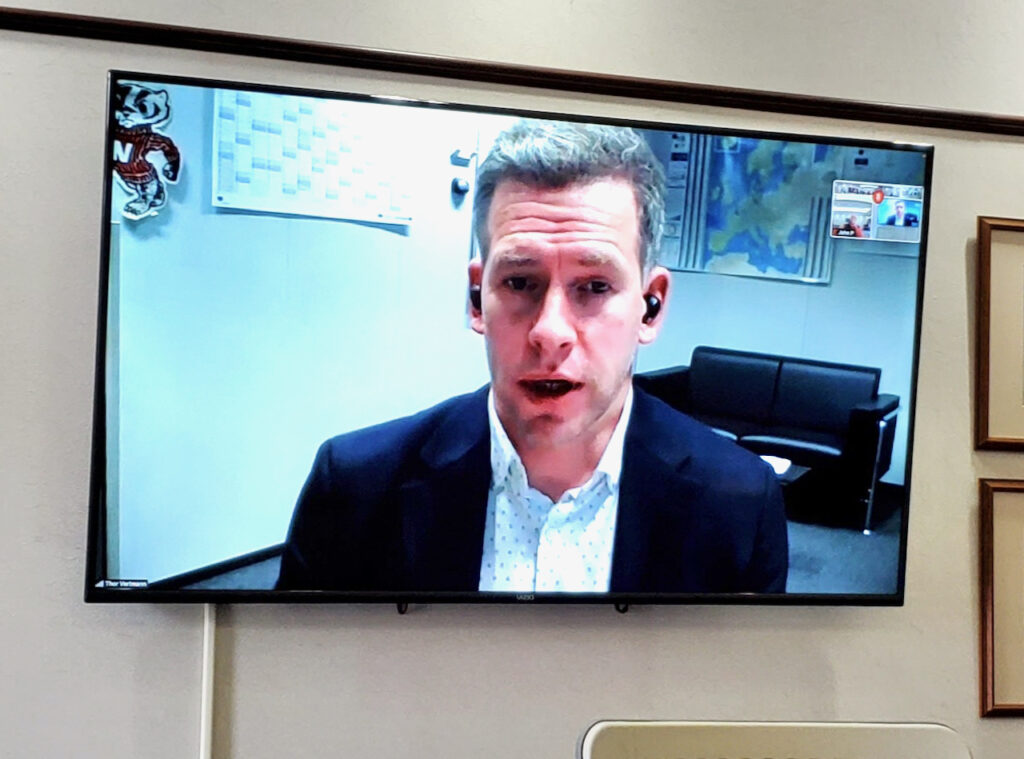
Former Whitewater High School foreign-exchange student Thor-Sten Vertmann addresses members of the Whitewater Rotary Club via Zoom in 2023. The meeting was held at the Irvin L. Young Memorial Library in Whitewater. Last month, he spoke to the Whitewater Rotary Club, area foreign-exchange students and members of Whitewater High School’s Model United Nations Club, also via Zoom. Vertmann lives in The Hague, The Netherlands. Since 2015, Vertmann has worked in Brussels, Belgium, serving two European commissioners — political appointments in European Union’s executive branch, the European Commission — from Estonia. File photo/contributed/Ron Binning.
This post has already been read 953 times!
Kim
Our Advertisers
Most Read Posts
- Our Take: If secrecy is embraced, transparency is disabled
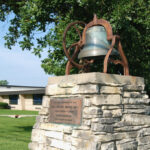
- Eight finalists make the cut in Whitewater WindUp competition; winner to be chosen May 18

- DOT: Two-phased improvement project slated for highways 11 and 12 in Walworth County

- Roundtable presenter shares affordable housing designs, cost-reducing construction options

- Commentary: Remembering journalist Sam Martino

- DOT: Department revokes three Elkhorn wholesale dealers' licenses

- BaristaCats Cafe takes first place in Whitewater WindUp competition

- UW-Whitewater May 2024 graduates receive degrees

- Food drive to support local pantries to be held Saturday

- CDA recommends approval of 128-unit multifamily development on Moraine View Parkway

Categories
- Advertisers
- Area events
- Art, culture
- Business
- Community
- County
- Crime, court
- Culture
- Diseases
- Economics
- Food
- Government
- International
- Law and Court
- Lifestyle
- Obituaries
- Opinion
- Police, fire, EMS
- Religion
- School
- Science
- Technology
- Today's features
- Today's news
- Top Stories
- Travel
- Uncategorized
- University
- World
